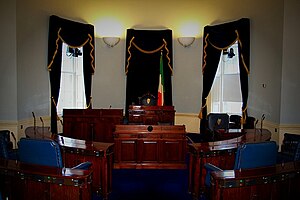 Image via Wikipedia
Image via Wikipediaby Jane Burgermeister
October 27, 2010
(Reuters) – Ireland’s finance minister has been urged by some senior advisers to allow the country’s 24 billion euro ($33 billion) state pension fund to buy Irish government bonds to support demand, an Irish official said on Wednesday.
The senior official, who declined to be named but is familiar with financial policy discussions in the Irish government, said no decision to take such action had been made.
A spokesman for Ireland’s department of finance, contacted by Reuters, said: “There are no proposals to do this.”
Tapping the fund, set aside to pay the state old-age pensions as well as pensions for Irish civil servants, could meet stiff political opposition. Roughly 10 billion euros of it are already earmarked to buy stakes in struggling Irish banks.
But some officials now believe a change in the law covering the fund, which currently prevents it from buying Irish bonds, could help the country as it prepares to return to the debt markets to borrow next year.
“That’s an asset that the government has which they can choose to use — it’s there,” the official told Reuters, adding that the “firepower” of the 24 billion euro fund could encourage other investors to buy Ireland’s debt.
“Under law, the fund is not allowed to invest in Irish government paper. To do that would require a change in legislation,” the official said, acknowledging that “raiding the fund” could prove politically difficult.
The suggestion is similar to one made by a prominent economist at Ireland’s Economic and Social Research Institute, a think-tank that is influential with the Irish government.
John FitzGerald, a member of a new Central Bank Commission which replaces the old board of the central bank, has recommended selling some of the investments in the pension pot to cut the country’s overall debt burden.
But using the fund to shore up Ireland’s finances is likely to ignite controversy amid drastic tax hikes and spending cuts.

No comments:
Post a Comment